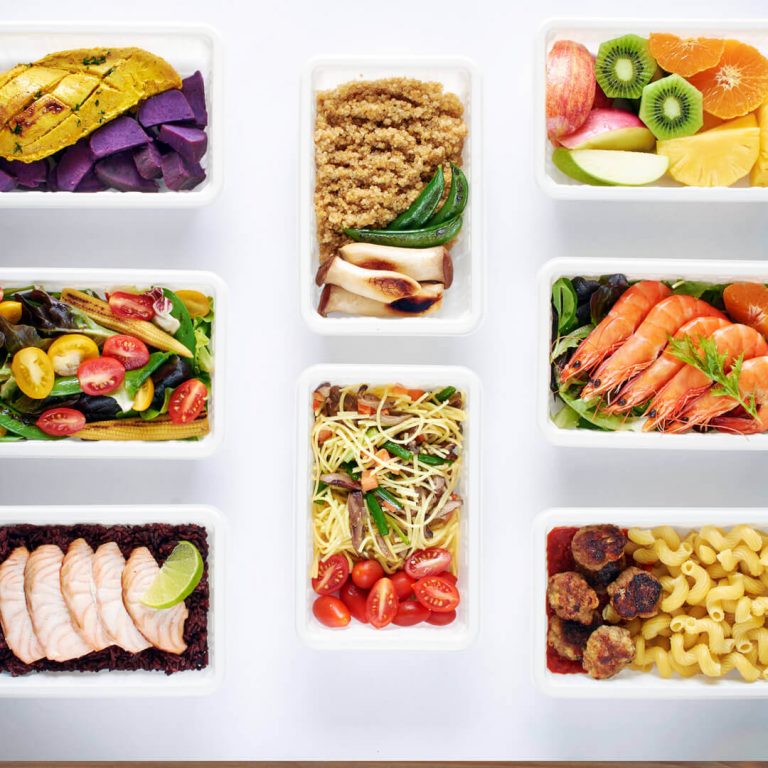Is your grocery bill killing your budget? This can happen for a lot of reasons. The cost of food might be rising due to inflation. You might be buying too many perishable items that go bad before you can use them. Maybe you’re not paying attention to produce that’s in season and buying out-of-season items that cost more because they travel longer distances to reach the store shelves near you.
Worst of all, your grocery bill might be affected by all of these factors at the same time. Fortunately, there is something you can do about it: meal planning and meal prepping.
How to Become a Meal Planner
Let’s focus on dinner since it’s usually the most expensive meal of the day. Dinner meal planning is thinking ahead about the nightly meals for the upcoming week and choosing in-season and on-sale food items that can have multiple uses so you avoid the following:
- Having to decide what to make for dinner after a hard day’s work
- Not being able to cook the meal you want because you don’t have the ingredients on hand
- Relying on fast food and other takeout because you’re in a hurry or forgot to defrost something
Here’s how meal planning works:
- Set aside planning time: You’re going to need about 30 minutes each week. For most people, it’s easiest to make time for this over the weekend, but pick a day that works for you that you can commit to every week. Consistency will help make this a routine.
- Check your fridge and pantry: During your planning time, figure out what food items you already have that can be used for the upcoming week’s dinners. List them out, in particular the produce and meats that won’t last beyond the week if they’re not used or moved to the freezer.
- Gather coupons and search store circulars: The goal is to find food items that are on sale this week or that you can get discounts on by using coupons.
- Consult your calendar: Take a look at what’s going on in your household in the week ahead and note how much time you’ll have to cook each night. For example, say your son has t-ball practice at 5 p.m. on Monday. You’ll need to plan something quick and easy for that night. But on Thursday when you get off work early, you can plan a more elaborate meal if you want.
- Select your meals: Using all the information you’ve gathered so far, decide what you’re going to cook each night. Let’s say you have some ground beef in the fridge that’s only good for a few more days. Plus, you have a coupon for marinara sauce and your grocery store is running a sale on pasta. You could plan to make enough baked ziti on Sunday to serve fresh that day and quickly reheat after Monday’s t-ball practice. Likewise, if whole rotisserie chickens are the special of the week, you can serve one with a big salad on Tuesday and use the leftover meat and veggies to make fajitas on Wednesday.
- Make your grocery list and shop: Create a list of everything you need for your planned meals and stick to it while you’re shopping. With good meal planning, this is hopefully you’re only shopping trip of the week.
In the beginning, keep your meal planning simple. Once you get the hang of it, you can be more adventurous with your dinners and add breakfast and lunch into your meal planning routine.
How to Become a Meal Prepper
Meal prepping goes a step further. After you’ve completed your meal planning and grocery shopping, you prepare your meals ahead of time in one way or another. Some people just prep all the ingredients for their weekly meals in advance. This can include chopping up fruits and vegetables, making sauces or stocks and pre-portioning dry goods, such as spices, beans, rice and pasta.
Others prefer to make several complete meals in one day that can be refrigerated and reheated in the next few days. Or you can make a large batch of something like lasagna and split it up into three or four portions: one that you eat in the coming days and the others that are stored in the freezer for use over the next few months.
Budget Benefits (and More) of Meal Planning and Prepping
When you intentionally plan your meals, you’re much less likely to pay full price for food, throw away unused food gone bad, rely on restaurant meals or make multiple grocery trips during the week that run up your fuel bill. This all adds up to money you can spend on other necessary things.
On top of these budget benefits, both meal planning and prepping means you experience less stress during the week. Plus, they make you more mindful of your nutritional goals, which leads to a healthier lifestyle and all the financial advantages that come with it.






Comments Section
Please note: Comments are not monitored for member servicing inquiries and will not be published. If you have a question or comment about a Quorum product or account, please visit quorumfcu.org to submit a query with our Member Service Team. Thank you.